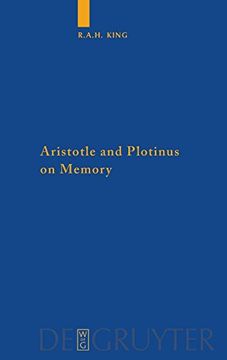Compartir
Aristotle and Plotinus on Memory (en Inglés)
Richard A.h. King (Autor)
·
De Gruyter
· Tapa Dura
Aristotle and Plotinus on Memory (en Inglés) - Richard A.H. King
$ 191.485
$ 201.563
Ahorras: $ 10.078
Elige la lista en la que quieres agregar tu producto o crea una nueva lista
✓ Producto agregado correctamente a la lista de deseos.
Ir a Mis Listas
Origen: Estados Unidos
(Costos de importación incluídos en el precio)
Se enviará desde nuestra bodega entre el
Miércoles 03 de Julio y el
Miércoles 17 de Julio.
Lo recibirás en cualquier lugar de Argentina entre 1 y 3 días hábiles luego del envío.
Reseña del libro "Aristotle and Plotinus on Memory (en Inglés)"
Two treatises on memory which have come down to us from antiquity are Aristotles On memory and recollection and Plotinus On perception and memory (IV 6); the latter also wrote at length about memory in his Problems connected with the soul (IV 3-4, esp. 3.25-4.6). In both authors memory is treated as a modest faculty: both authors assume the existence of a persistent subject to whom memory belongs; and basic cognitive capacities are assumed on which memory depends. In particular, both theories use phantasia (representation) to explain memory.Aristotle takes representations to be changes in concrete living things which arise from actual perception. To be connected to the original perception the representation has to be taken as a (kind of) copy of the original experience - this is the way Aristotle defines memory at the end of his investigation.Plotinus does not define memory: he is concerned with the question of what remembers. This is of course the soul, which goes through different stages of incarnation and disincarnation. Since the disembodied soul can remember, so he does not have Aristotles resources for explaining the continued presence of representations as changes in the concrete thing. Instead, he thinks that when acquiring a memory we acquire a capacity in respect of the object of the memory, namely to make it present at a later time.
- 0% (0)
- 0% (0)
- 0% (0)
- 0% (0)
- 0% (0)
Todos los libros de nuestro catálogo son Originales.
El libro está escrito en Inglés.
La encuadernación de esta edición es Tapa Dura.
✓ Producto agregado correctamente al carro, Ir a Pagar.

